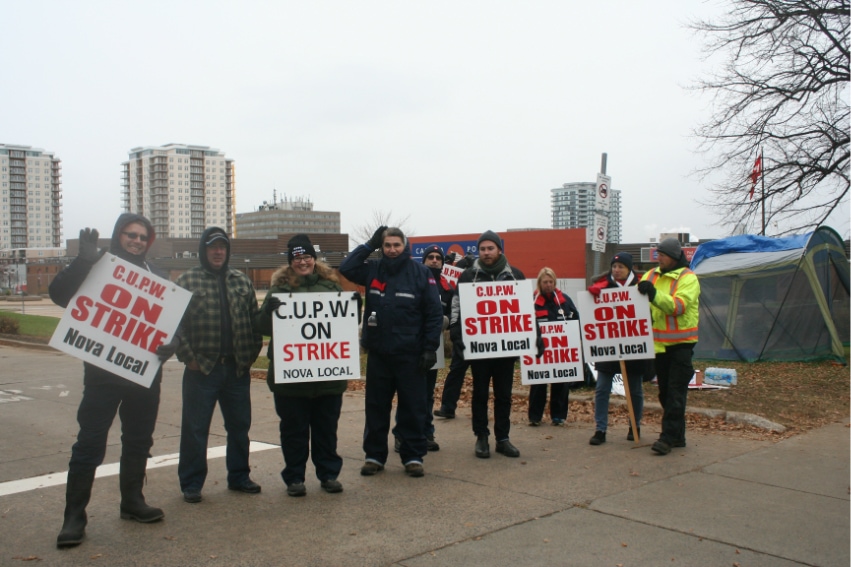
Updated November 13, 11 pm, to reflect a Nova Local press release announcing that the strike will continue until further notice.
KJIPUKTUK (Halifax) – Some 700 Canada Post workers, who provide mail service in the urban parts of HRM and from Lake Charlotte to Hubbards, walked off the job today.
The issues are about health and safety, workload in relation to on-the job injuries to postal workers, and equality between urban and rural letter carriers.
The Canada-wide rotating strikes, which started on October 22, also in Halifax, have caused some delays in mail delivery. Nonetheless, 12 months of bargaining and now the work interruptions have so far not led Canada Post to budge much from its original position.
Earlier today, when this article was originally written, I assumed that this was to be another one-day strike, as was the case with the other rotating strikes across Canada, and indeed an earlier one-day strike in Halifax on October 22.
But at 10:21 PM this evening the CUPW Nova Local emailed a one-sentence press release announcing that this strike will continue until further notice, clearly in an effort to increase the pressure on Canada Post..
Meanwhile, the federal government has said that it is looking at all options, which many people take to be code for back-to-work legislation.
Earlier today we paid the picketers at Canada Post’s large processing plant on Almon Street a visit, and we talked with Mike Keefe, 1st vice president of the Canadian Union of Postal Workers (CUPW), Nova Local, to find out more about the negotiations.
Keefe wants Nova Scotians to understand that there is more at stake than money.
“Wages are a small component, but this is also about injuries on the job. Canada Post reports that its workers have 5.4 times greater injury rate than the rest of the public sector, greater than any other public sector workers, greater even than longshoremen. That is part of what we’re trying to deal with,” Keefe says.
Keefe points to the increase in parcel mail to explain the increase in on-the -job injuries.
“Parcels have really taken off, last year we had 35 days that we delivered a million parcels in a day. That means more and more days of 10 to 12 hours for letter carriers. Meanwhile we have inside workers dealing with an awful lot of non-ergonomic equipment. No wonder injury rates are going up across the board,” Keefe says.
Another big issue is the continuing disparity between rural and suburban letter carriers and their urban counterparts.
In September of this year an arbitrator ruled that there was no pay equity between the two groups, which for a majority of the Crown agency’s mostly female rural and suburban carriers, known as RSMCs, meant a healthy pay hike, plus some increased benefits.
But other disparities remain, says Keefe. Medical benefits aren’t part of their retirement package, for instance, and Keefe says that some rural carriers continue to work well into their seventies because they can’t afford to retire and lose those benefits.
Keefe believes the future for Canada Post doesn’t look bleak at all, regardless of what many people, Canada Post management among them, like to believe. How could it be, with parcel mail and flyer deliveries on the increase, and 3 billion regular letters delivered last year? “We’re hardly a dying industry,” Keefe says.
Yet, Canada Post is fixated on its current package of services, and CUPW wants it to stop resting on its laurels. That’s why CUPW continues to push for things like postal banking and a transformation of rural post offices into community hubs.
“Every week there is another rural bank that closes somewhere in Canada. There are 1200 rural communities in Canada that do not have a bank, but do have a post office,” says Keefe. “As well, let’s turn those rural post offices into community hubs, let’s set them up to be charging stations for electric cars, hubs for high speed internet, there is so much you can do.”
The last time postal workers were on strike, in 2011, the Harper government legislated them back to work. In 2016 an Ontario Superior Court judge ruled that was a violation of the union’s rights.
Nonetheless, Keefe is afraid that the Liberals may also use back-to work legislation to end the strike, regardless of the Ontario decision. Things were different in 2011, he says, in that postal workers were locked out by Canada Post, and that Harper’s legislation imposed several conditions and a wage settlement that was lower than Canada Post’s latest offer.
“I am asking anybody who cares about Canada Post to contact their Member of Parliament, and to contact Justin Trudeau, and tell them that rather than put pressure on the workers they should pressure Canada Post to finally bargain for real,” Keefe says.
See also:
With a special thanks to our generous donors who make publication of the Nova Scotia Advocate possible.
Subscribe to the Nova Scotia Advocate weekly digest and never miss an article again.



